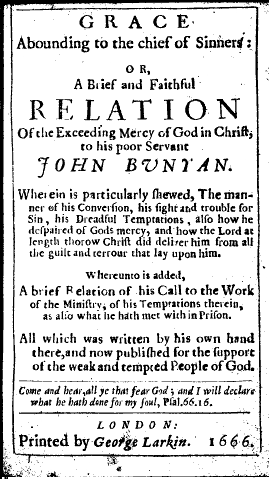Grace Abounding to the Chief of Sinners
Grace Abounding to the Chief of Sinners is a spiritual autobiography written by John Bunyan, a prominent Puritan figure known for his theological writings as well as for his seminal work, The Pilgrim's Progress. First published in 1666, Grace Abounding to the Chief of Sinners offers an introspective look into Bunyan's spiritual journey and his struggles with faith and sin before his conversion to Christianity. This work is considered an important piece of Puritan literature and has been influential in both religious and literary circles.
Overview[edit | edit source]
Grace Abounding to the Chief of Sinners is divided into several sections, each detailing a specific period in Bunyan's life, from his sinful youth, through his spiritual awakening, to his eventual acceptance of God's grace. The autobiography is deeply personal, reflecting Bunyan's internal conflicts, fears, and his profound sense of guilt over his past sins. Through his narrative, Bunyan seeks to offer hope and guidance to others who might be experiencing similar spiritual turmoil, emphasizing the possibility of redemption and the boundless grace of God.
Themes[edit | edit source]
The primary theme of Grace Abounding to the Chief of Sinners is the transformative power of God's grace. Bunyan illustrates how, despite his unworthiness and deep-seated sinfulness, he was able to find salvation and peace through faith in Jesus Christ. The autobiography also explores themes of despair, repentance, and the struggle between belief and doubt, providing a raw and honest account of Bunyan's spiritual battles.
Impact and Legacy[edit | edit source]
Grace Abounding to the Chief of Sinners has had a significant impact on Christian literature and is often studied for its insights into Puritan theology and spirituality. Its candid and heartfelt narrative style has also influenced the autobiographical genre, particularly within religious writing. The work remains widely read and respected among scholars and lay readers alike for its theological depth and its honest portrayal of the human condition.
See Also[edit | edit source]
This article is a literature-related stub. You can help WikiMD by expanding it!
Search WikiMD
Ad.Tired of being Overweight? Try W8MD's physician weight loss program.
Semaglutide (Ozempic / Wegovy and Tirzepatide (Mounjaro / Zepbound) available.
Advertise on WikiMD
|
WikiMD's Wellness Encyclopedia |
| Let Food Be Thy Medicine Medicine Thy Food - Hippocrates |
Translate this page: - East Asian
中文,
日本,
한국어,
South Asian
हिन्दी,
தமிழ்,
తెలుగు,
Urdu,
ಕನ್ನಡ,
Southeast Asian
Indonesian,
Vietnamese,
Thai,
မြန်မာဘာသာ,
বাংলা
European
español,
Deutsch,
français,
Greek,
português do Brasil,
polski,
română,
русский,
Nederlands,
norsk,
svenska,
suomi,
Italian
Middle Eastern & African
عربى,
Turkish,
Persian,
Hebrew,
Afrikaans,
isiZulu,
Kiswahili,
Other
Bulgarian,
Hungarian,
Czech,
Swedish,
മലയാളം,
मराठी,
ਪੰਜਾਬੀ,
ગુજરાતી,
Portuguese,
Ukrainian
Medical Disclaimer: WikiMD is not a substitute for professional medical advice. The information on WikiMD is provided as an information resource only, may be incorrect, outdated or misleading, and is not to be used or relied on for any diagnostic or treatment purposes. Please consult your health care provider before making any healthcare decisions or for guidance about a specific medical condition. WikiMD expressly disclaims responsibility, and shall have no liability, for any damages, loss, injury, or liability whatsoever suffered as a result of your reliance on the information contained in this site. By visiting this site you agree to the foregoing terms and conditions, which may from time to time be changed or supplemented by WikiMD. If you do not agree to the foregoing terms and conditions, you should not enter or use this site. See full disclaimer.
Credits:Most images are courtesy of Wikimedia commons, and templates Wikipedia, licensed under CC BY SA or similar.
Contributors: Prab R. Tumpati, MD

